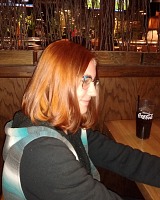 |
| Ginny Weasley. |
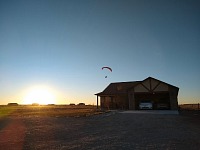 |
| When our neighbor drops in for a chat. |
Lisa had been wishing to be red-headed for some time now. Back still in
California, we tried a temporary color at home, but for this I don't quite have
the patience, and the result was therefore more a participation trophy than
a top accolade. Here, in the Land of Laughter and Singing (as everywhere else
you'd be muzzled), even hair salons are open, and so Lisa could make an
appointment and come back home with a new head. As it was right on Halloween,
we teased her that she could just be Ginny Weasley. We did not celebrate
Halloween much this year; in our spread-out neighborhood, it makes little sense
to go trick-or-treating, and we did not expect anyone to show up — thus
we went to celebrate the occasion to a local sushi place.
In the end we made Tom go to get his hair cut as well — he even made
his own appointment (OK, so there are some covid restrictions after all)
— I had cut his hair in the summer myself, and although it was not
horrible, there were... uh, some irregularities... in the hairline.
Very shortly after the move, we began to deal with our animal situation. The
one with our own animals, to be accurate. The house came with a large barn,
which serves as a garage and a storage, and then there was a horse shed.
Horses, however, are quite different animals than goats — they are
content with an open shelter, which protects them from wind and rain —
and they need enough hay to keep them warm. Goats have a thick, warm cashmere
winter coat — but it works just like a wooly sweater — wind cuts
right through it, and rains soaks in. Goats are ruminants and must regularly
lie down and chew their cud and digest — so they not only need a place
out of wind, but also dry enough to lie in it "wearing a sweater".
Thus we retained a local handyman named Rick, to close the shed off, equip it
with doors, install insulation, and generally prepare it for the arrival of our
goaties. When Rick announced that he bought a dog door, I did not understand.
When he stressed that it was insulated, I realized I was very right to
hire a local guy, and give him free rein. In California, my goaties lived in
a de-facto wire cage — which had protected them from cougars; during
winter rains it was enough to wrap the cage in tarps, or in a better case
clip on plastic sheets. Here, with winter temperatures dropping to minus ten
and wind gusting up to eighty miles an hour, one must think of the option
to let the goats out, but prevent wind, snow and blizzard from getting in.
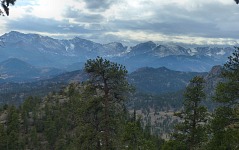 |
| Rockies. |
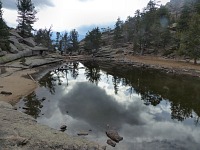 |
| Gem Lake. |
We also modified the pickup so that our goaties would fit in it. It seemed
simpler to load two dwarf goats on the bed than attaching a towing ball and
buy or rent a horse trailer. Naturally, animals cannot be just loaded in —
we had the bed lined so that it would be easily sprayed out, and purchased a
camper top — to prevent the goaties from falling out and to keep them
out of the cold. After all, it's a thousand miles trip, and no fun at all.
Then the fence needed changing. Original owners had their horse run solved by
three regular and one electric wire. A goat would jump between those wires or
crawl under, and the electric wire can't be put low enough to hit the goat and
not keep shorting to ground (see rain, snow, and wind the speed of a express
train). Besides, I don't like electric fences. So: find a fence whose price
would not bankrupt us, and still withstand the goats — i.e. sturdy
construction that won't get butted through, even by the most persistent goat.
I can already disclose that we did not succeed; momentarily we are in the phase
of reinforcing the fence between posts by hammering three-foot, bent steel
crow-bars into the ground, with the hope that one of these days the goats won't
find any more weak spots.
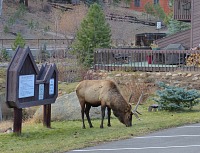 |
| Chuck decided to exploit the advantages of city living. |
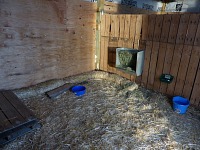 |
| Shed is insulated, equipped with bedding, hay and water — ready for the goats. |
But I'm getting ahead of myself — for the time being, I lived the myth
that we were ready for the goaties' arrival, and thus we began to plan how to
do it. And mostly when. A thousand miles stretches between our new home and
Colleen's ranch, crossing one time zone and two mountain ranges, which in
November is nothing to laugh about. Interstate 80 is infamous for resting semis.
When it blows, a large truck, especially with an unloaded trailer, tips over
to its side. Which subsequently blocks the freeway, as some are dealing with it,
while the rest rubber-neck. Alternatively, the freeway gets closed for wind
altogether — or they close it for failing to remove wind-blown snow-piles.
And of course every mountain range has a different weather and climate, and
their respective storms don't synchronize (even just because they have to fly
hundreds miles between the heights), so parts of the I-80 get closed
alternatively. As we don't know how to teleport (would not need a freeway then,
right?) — our trip each way takes two days — which resulted in our
needing four continuous days of decent weather in two sets of mountains at the
same time.
We had also hoped that weather would be merciful and allow us travel on
a weekend, but in the end we reckoned that it was smarter to go as soon as
a window opened, not waiting for the situation to improve with the onset of
winter. While we waited for a storm to pass in the Sierra, we made a local trip
to the Rockies. On one hand, not to just sit at home, on the other hand, to
see Peter, our friend from California, who was temporarily lodging in a house
of our other friend, Karel. We chose a hike to Gem Lake, which we liked four
years earlier, when we ourselves stayed at Karel's.
The hike is still pretty, but autumn chilly weather did not offer as beautiful
and optimistic vistas as it had during the summer season. Even less optimistic
were views of local Coloradans choking in their face masks. No-one had ordered
them to wear masks OUTDOORS, but sheeple live everywhere. Those especially
pandering, force the cloth over the mouth of small children. I felt
particularly sorry for a desperate whiny toddler. In altitudes around eight
thousand feet, where we exercised, it was rather taxing to breathe as we were,
even without a muffler.
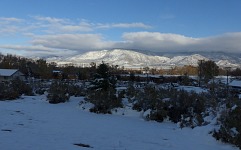 |
| Back in California, near Nevada border. |
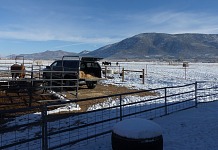 |
| Camper top of the pickup has nice room for my goaties. |
Gem Lake was half-evaporated, but still we sat down and had a snack. Then we
hurried back downhill — one thing did not change in four years; in the
afternoon, weather in the mountains happens. Storms in summer, now in early
November it promised more like a blizzard. And we had a date with Peter, with
whom we wanted to have a chat and a dinner.
Yet when arriving to the house, we were surprised by Chuck — a local elk,
who had decided to exploit all the comforts of civilization, like sidewalks,
artificial ponds, and sprinkled — therefore always green — grass in
city parks. Perhaps he even figured that here in the middle of the city, nobody
is going to shoot at him, despite the hunting season being on.
After a dinner with our friend, on Sunday November 8, we loaded a bale of straw
in our Ford bed, some hay for the ride back, sleeping bags and snacks, and
drove out. Still close to home, in Medicine Bow, we ran into our first traffic
complication — though we had waited until the winds calmed a bit, but we
did not anticipate all the other truck drivers waiting as well; we had to cross
our first mountain range at a walking pace. Fortunately in Laramie things began
to roll, and we reached Ely, Nevada, just in time for dinner. On Monday
afternoon we rang the bell at Colleen's. Having settled our debts, we checked
the goats, who seemed taken aback by my reappearance — they must have
quite liked their herd with handsome buck Jasper. Alas, our further plan to
have a dinner at Jeff's Mountain View Barbecue, hit an obstacle in the form of
a closed door. We did not manage to see Craig either, for after all, folks work
on weekdays. We scored extra points at Meadowcliff Lodge — when I stepped
out of our room to fetch stuff from the car, Sid — at the car already
— called out to me, "watch out!" — I thought that perhaps
an icicle was falling off the roof, and so I hunched down and rushed out of the
room — letting the spring-loaded door slam behind me — with the key
left inside, of course. We had to wade through snow for a spare key.
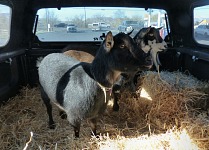 |
| Goats loaded. |
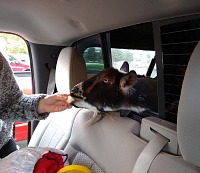 |
| A bribe. |
I expected that our short California visit would evoke a bunch of nostalgia,
but no such luck. Restaurants plastered with thousands of — apparently
mandatory — official papers with orders, warnings and notices, so one
could not even find information about opening hours. People wearing masks,
everywhere and all the time — out of fear of being reported as rule
breakers. A feeling of a trap clattering shut, from which there is no escape.
Not that one could not live in it (for now), but there was palpable fear of
the inscrutable future, of what would happen to a family business and the
family itself, when it all goes bankrupt. Meanwhile just a jump across the
border, in Nevada, merry yellow school buses were zig-zagging across the
country and life went on, somewhat.
So on Tuesday morning, after breakfast, we loaded our goaties, and in fact felt
a lot better, when we pointed the snout of our Ford back to the east and began
nibbling from our long long journey home. We were traveling through a sunlit
landscape that had just witnessed its a first winter storm of the season, where
on the backdrop of snow-white mountains, shaded by dark forests and ravines
like in a Japanese drawing, bright yellow aspens glowed with their fall leaves.
The goats suffered the trip rather stoically, only after five hours declared
that they expected to be home by now, as before. Well, we had still twelve
hours to go. I gave them water whenever we stopped, and sometimes bribed them
with fruit, and promised better future. By nine in the evening we stopped at
a sushi place in Evanston — we had dinner, and the goats had finally lied
down. They somehow did not figure out that it was OK to rest in the truck bed,
they stayed alert and watched out of the windows. Even after dark it did not
get better, then they tracked headlights of other cars. We made it home
sometimes around three in the morning, moved the goats to the shed and went to
sleep.
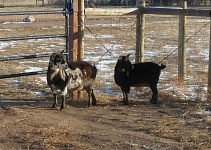 |
| Goaties search for a place where other animals live here. |
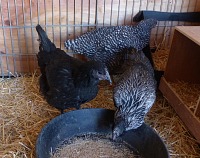 |
| So we got them three companion chickens. |
We had thought that by enduring a thousand mile journey with our goaties, we got
the worst part behind us. We were quite wrong. Goaties did not like the prairie;
they said that since no other animals live here, it's really strange and it
would be best to look, WHERE all normal goats and horses live. When I chased
them, horrified, back from the local, very busy county road, it was clear it
could not go this way.
I obtained leashes for my goats and they graze now on leashes. And I reckoned
they need some company — they lived all their lives in stables, with other
goats, horses, chickens, and a whole crowd of people, and an empty prairies must
be really scary for them. Naturally, getting suddenly more goats or horses was
nonsense, but I considered chickens a viable alternative. I had planned
originally to build a coop in the spring and raise chickens from chicks —
but now there was no time for it. With a tear in my eye I remembered Vanilla,
and cursed myself for not having adopted the very chicken, and not having taken
her along. But, no matter, I started looking for local chickens.
Not much luck in November — had I known more people here, perhaps I could
have found someone who'd be willing to get rid of an old, no longer egg-laying
chicken or two, but running around from one local farm to another and asking for
used chickens did not seem like the best way how to introduce self in the
neighborhood. Eventually I found a breeder in Colorado on a craigslist, who
was selling four-month old chickens. I spoke with her on the phone and ordered
three birds. She was very nice and professional, did not comment, when I
disclosed that they were planned as psychological therapy for goats.
Lisa and I went to pick our chickens on our way to her vaulting. On the spot we
discovered that besides chickens the breeder also had goats, so we invited
ourselves to a tour of the goat runs, where I found some inspiration for our
fencing. Our goaties keep finding escape routes out of their (huge) pasture
faster than I manage to fix them. I don't want to keep them locked in the
shed — here we found stiff wire-mesh panels that can be simply assembled
into a small corral. And so, besides chickens, our goaties got a small run
in front of their shed, where they can jump outside, and I don't have to worry
that they end up wandering down the county road again. The run can be relatively
easily re-configured (since wires don't need to be spun and stretched, nor poles
anchored in the ground, which would hold up the tension) — and even for
the chickens is better to have a small, easy to scrutinize run, instead of
chasing them all around the prairie.
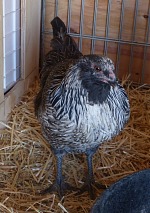 |
| Sasha is the most peculiar one, looking like a predator. |
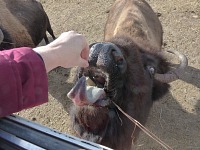 |
| Some feed birds in winter, in Wyoming we feed bison. |
Eventually Lisa and I picked three chickens. The most peculiar one is
Ameraucana — originally South-American breed, which looks a bit
like a predator — with minimalist comb and yellow eyes, has the head of
a hawk. Besides that she grows feathers on the side of her head, so she looks
a bit like wearing headphones. And is supposed to lay blue eggs. Our next
chicken is
Black Australorp. Her black feathers shines greenish, and her
brown eyes make her a mild and handsome beauty. For our third chicken we chose
an "ordinary" spotted
Barred Rock. We named the spotted one
Pepper, black one
Jet and the Ameraucana is
Sasha after
a Czech sitcom character, for being bashful. She kept her bashfulness, and alas,
especially Pepper does not treat her very nicely. So I sometimes give Sasha
treats behind the other chicken's backs. On the other hand, I have seen her
cleverly standing up on a pallet to be higher, and making waves with her wings,
until Pepper retreated. So she's not such a wimp after all — and she can
find her food somewhere on the side. Ameraucanas aren't very "cuddly",
it's a rodeo to catch Sasha, but once caught she quiets down and keeps calm.
Pepper is ... well, a chicken, no other way to put it. Confused, hysteric,
always cluck-clucking in protest. She lets us catch her, and in reality probably
enjoys being the center of our attention, but will make a scene out of it.
Jet seems to me the smartest of them all, and the bravest — and also the
most level-headed and cuddliest.
The shed is divided by a partition with a door into two halves. One is occupied
by the goaties, the other is my barn / storage / shop with bales of hay and
straw, tools, barrels with fodder etc. The chickens have their temporary coop
located in the shop area, with a door leading to the goats. You see, chicken
food is toxic for goats, they can even die of it, and so it's necessary to get
the chickens what they need without the goats being able to get to it
themselves. In reverse, chickens can eat "everything" and they only
benefit, whenever they supplement their diet with hay and grains from the goats.
Anyway, it seems to me that the chickens have figured out that their main job
is to entertain the goats, and fill their role rather well. The goats are
certainly much better settled and relaxed.
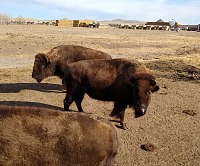 |
| A steel-plated train makes its way through a herd of these respectfully large cows. |
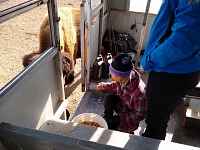 |
| Feeding ensues from the safety of the train car. |
Besides rebuilding the goat shed, we managed to buy beds for our children. We
had not even attempted to move their fifteen year old, lumpy ones from
California — and thus so far in the new house the kids slept on temporary
fold-up mattresses. So we made a pilgrimage through local outlets. Lisa got
intrigued by a "cold" mattress — claiming to feel hot at night,
she wished for a cooling bed. My head does not compute that; I want to be warm
and cozy in my bed, but apparently Lisa is not the only customer of this kind,
when they manufacture and sell such contraption. The catch was in the fact that
such bed gets made and sold in Denver, Colorado, which extends delivery to weeks
or months, because covid (if you don't understand what covid has to do with
trucking an already finished and warehoused item across the space of one
hundred miles, don't be upset, we don't understand it either — for even
with an ox-drawn carriage, it could not take longer than one week).
Tom had selected an ordinary bed, from a local supplier, and so he could sleep
on it right next Monday (we toured showrooms on Saturday). We liked his bed so
much, we purchased another one for our guest bedroom. We truly don't insist as
much on our guests feeling extra comfortable (especially since we rarely have
any), but we often use that bedroom for ourselves as a backup. Sid snores,
sometimes works late, and then goes to bed late, or one of us is ill or needs
to get up early in the morning — and it's nice to be able to split. After
years when such splitting meant that one of us was relegated to sleeping in the
living room, with fridge noises from the kitchen, and aquarium noises from the
office, now a chance to be able to retreat into a REGULAR bed, and close the
door behind, is a veritable luxury.
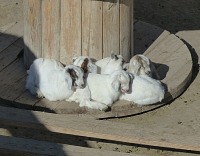 |
| They have already five baby goats at Terry Ranch. |
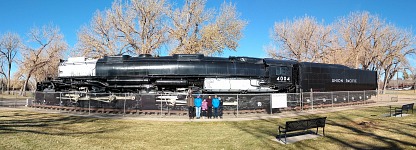 |
| Largest steam engine in the world — Big Boy. |
Moreover, we had in fact expected friends for our first great visit, on
Thanksgiving. Sid's California colleague Petr came to talk about work and
non-work issues, and somehow he talked even his wife and kids to endure
a two day drive (each way) across a third of the continent. Blanka was, on
top of it, pregnant, and we reckoned that for her bravery regarding travel,
she deserved a real bed. So Lisa still had not received her Colorado mattress,
and we got a second bed from our local Bedder Sleep — because this
family store is capable of lightning speed action.
We were a bit nervous how we would accommodate five guests, but our new —
larger — house swallowed them apparently without problems. Juniors claimed
the basement and obviously fit in. We old geezers were distributed in upper
bedrooms, with the men in the office throughout the day, while Blanka and I
claimed the kitchen and living room. On top of that, we spent most of the time
outdoors, as we took our visitors to Terry Bison Ranch. Even we locals were
curious how a bison train works, and we paid for a ride. This being off-season,
it was just us on the train. The metallic contraption would indeed take you
in the midst of a (small) bison herd, where you can not only see these giant
cattle up close, but feed them as well. All this from the safety of the train
car — though the herd surrounding the train is relatively tame (rather
used to be fed by tourists), the guide pointed out that no one is allowed to
retrieve things dropped from car windows. When you see a head with more than
a yard of skull between the eyes, you realize that such a giant truly is not
a household pet.
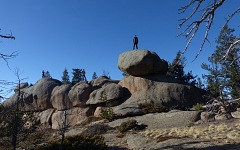 |
| Conquerors. |
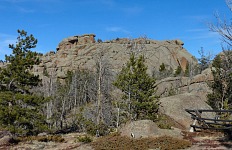 |
| Rock massif at Vedauwoo. |
I had written numerous times that I like the holiday of Thanksgiving. Mostly
because it is a family and friendly occasion, with rumor mills, cooking —
un-smothered by presents and great expectations. Simply good times and being
home and dry during winter sleets. We had not hoped that exactly this year, we
would have the opportunity to celebrate the way we like it — and in the
end it happened. In the evening we sat down with our friends to a dinner,
obtained and prepared with joined effort. After ten months spent more or less
in isolation from other members of homo sapiens, whit was a very invigorating
and refreshing experience — we felt again a bit more like humans, not like
mere prisoners in a very Orwellian Absurdistan.
Our buddies, alas, were leaving again on Friday, and Tom with Sid drove a little
along their route home, "to the top of the hill", to Vedauwoo, into
beautiful rocks and trees at 8,500 ft elevation. Lisa had a paid vaulting
practice, with a famous and successful performer, which we did not want to miss,
and so we dispersed into all directions at noon.
























